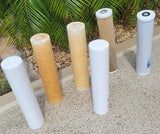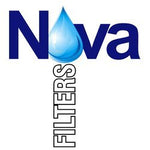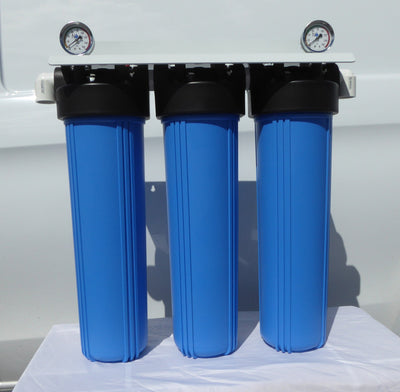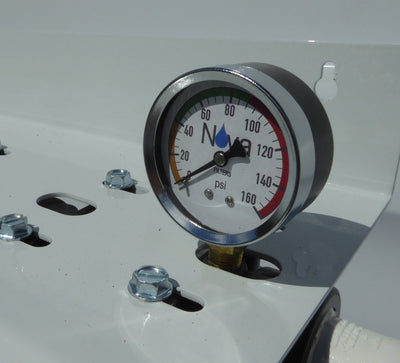Whole House filter
The number one selling whole house filter in Florida, two pressure gauges and on/off schedule 80 valve included, price includes set of three filters.
Whole house water filter systems do just what their name implies — they filter water that enters your home before it makes its way into different rooms. So, if you install a whole house system to reduce sediment, chlorine, chloramines, and other contaminants in your water, you'll enjoy cleaner, refreshing water in no time. It will not just clean water from the faucet, either. A whole house water filter cartridge will also clean the water in your shower, laundry, and dishwasher as well.
So, what’s the best whole house water filter for cleaning your water?
We will answer this question a little later on. First, let’s look at how a whole house filter cleans your water:
Why do you need a whole house water filter?
Whole house water filters remove harmful elements from your drinking water. Though many substances can enter the water supply, there are three categories that you should be the most concerned about: sediment, chemicals, and plastics. Over time, these three elements can wreak havoc on your drinking water, eventually causing damage to your appliances faucets etc and your health.
First, let’s take a look at sediments:
Sediment Removal
Sediments are tiny particles of rust, clay, sand, and other similar materials. They commonly work their way into water supplies after storms, though they can also get in with virtually no outside help. Since these sediments are so small, it’s very easy for them to enter the water before it reaches your home.
Generally, if you see buildup on your faucets or other surfaces it is mistakenly thought to be scale or calcium, there maybe calcium but a higher percentage is sediment-
when these are filtered out these deposits diminish dramatically in some homes completely.
Our filters stop the sediment.
| This set clearly shows trapped sediment after 26,000 (the filter on the left is carbon The carbon is on the right in the picture above , observe how clean it is because the other two cartridges have removed the sediment beforehand. Dramatically improving its service life. |
 |
Next the Coconut Carbon in Nova Filters
Carbons are made from different raw materials possessing vastly different pore size ranges and iodine ratings, which lend themselves toward certain applications. Carbon can be made in many different ways and each type is best suited to a different application. Over the years Nova tested and developed the highest-grade coconut carbon used initially in our aquarium stores over 20 years ago. The results with delicate marine & tropical fish were obvious they were thriving in this purified water.
Meeting the requirements of NSF/ANSI for Chlorine Taste and Odor, VOCs and THMs reduction, Lead reduction, Chloramine reduction, California Proposition 65 for Arsenic and other requirements relating to purity and safety of their materials of construction and manufactured is certified by ISO9000 standard.
Carbon is very effective at removing many contaminants, including the following:
- Residual chlorine and monochloramine
- Taste and odor causing organic contaminants
- Volatile organic compounds (VOCs)
- Trihalomethanes (TTHMs) and other halocarbons
- Endocrine disrupting compounds (pharmaceuticals, personal care products, etc.)
- Chloramine, hydrogen sulfide and hydrogen peroxide (removed by catalytic carbons)
Carbon must not be the sediment filter, it is best for it to act only as an adsorbent for dissolved organics, not the filtration of solids. When a system doesn't pre-filter sediments the carbon gets coated with the sediment in so doing there is no longer direct contact of the carbon and water without contact it will not work effectually.
Therefore, small single carbon filters or canisters just don't work efficiently they get clogged up with sediment then the carbon gets coated with sediment.
We use two sediments in the Nova Whole House filter before our carbon.
Carbon has a finite use based on gallons of water passing thru it. All carbons can only absorb so many contaminants before losing it’s effectiveness and its adsorption efficiency. This happens when the pore structure of the carbon is so full that it cannot adsorb any more impurities. At 26,000 gallons, the Nova Carbon is typically deemed spent, and would need to be replaced.
We recommend carbon remain in drinking water filtration system for more than 12 months. Interesting to note that carbon left unchanged in aquariums will have a detrimental effect on live aquaria due to loss of its effectiveness.
There is more than one company selling carbon tank filters claiming they will last 5 years I cringe when I see this here’s why.
Carbon filters in water filters have a limited ability to adsorb contaminants from water, and so the carbon filter in water purifiers should be changed when it has been depleted and cannot purify water anymore.
At this stage the carbon will start rejecting some of the previously adsorbed pollutants back into the water flowing over it. This is called ‘breakthrough’. When this happens, the concentration of pollutants in the treated water will be higher than in the raw water being treated.
We use the best activated coconut hay carbon in our Nova water purification system this proprietary aquarium grade carbon has the highest iodine rating available is the microporous type and they are best for removal of chlorine and it's by-products called TTHM's and volatile organic compounds or VOCs in water.
We have test results from an independent laboratory taken from homes in The Villages Fl. that clearly demonstrate this.





